Welcome, Ann!
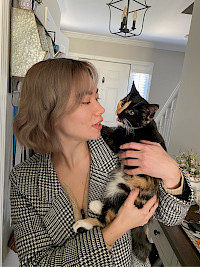
Ann Foo is a new Science Communicator at IAN. She graduated from the University of Maryland, College Park, with a B.S. in Cell Biology and Genetics and a B.A. in Classical Languages and Literatures. Ann previously did research on foodborne pathogens and on the gut microbiome. Ann has a cat named Toast and enjoys cooking, listening to podcasts, and going to museums.
Patuxent River Stakeholder Listening Sessions are underway
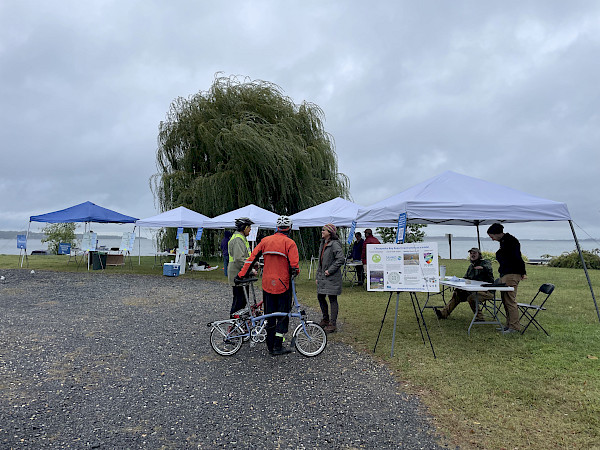
On Wednesday, October 5th, we held a Stakeholder Listening Session for the upcoming Patuxent River Report Card at the Chesapeake Biological Laboratory. Despite the overcast weather, dozens of people turned out to talk with our science communicators about values and threats in the watershed and participate in our interactive stations. A second Stakeholder Listening Session was held at Jug Bay Wetlands Sanctuary on Saturday, October 8th. We are glad to see people give their input on the Patuxent River!
Science communication course
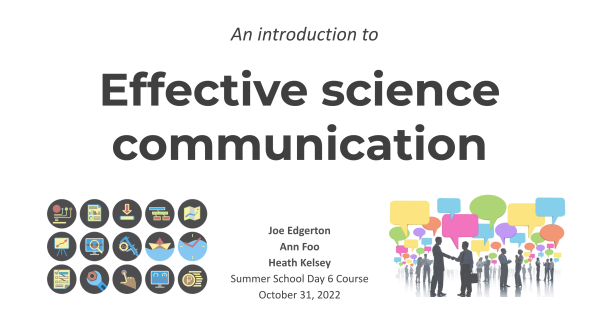
On October 31, IAN collaborated with Future Earth Coasts to teach the last lecture in their Monsoon School series of classes. The course was organized so that students from across the world attended a 6-day series of lectures and worked together to apply the concepts and tools they learned to tangible research projects. Our science communication lecture, taught by Joe Edgerton, Ann Foo, and Heath Kelsey, covered the importance of good science communication, narrative structure, data visualization, design, and long-term evaluation of transdisciplinary projects. The three-hour course focused on providing tools, techniques, and resources for effective science communication. We were glad to have such an inquisitive and engaged group of students to work with, and hope to see the results of their work soon.
Second LENS workshop held in Tennessee
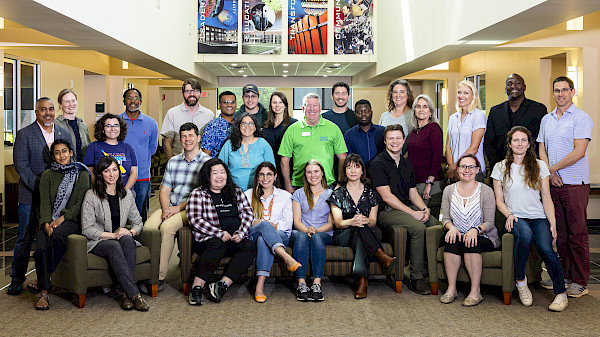
From April 18 to 23, Andrew Elmore, Ann Foo, and Katie May Laumann facilitated the second Landscape Exchange Network for Socio-Environmental Systems (LENS) workshop in Knoxville, Tennessee. Hosted at Oak Ridge National Laboratory, the workshop included hands-on data tutorials and talks on remote sensing, archetype analysis, and stakeholder engagement. The workshop included two visits to National Ecological Observatory Network (NEON) remote sensing sites, one in Great Smoky Mountains National Park, with history and background provided by National Parks Service researchers, and the second on the Oak Ridge campus. Participants also received tours of Oak Ridge’s supercomputers and historic graphite reactor. We look forward to seeing what everyone from the workshop does with what they learned!
Coastal Bays classroom maps make their debut
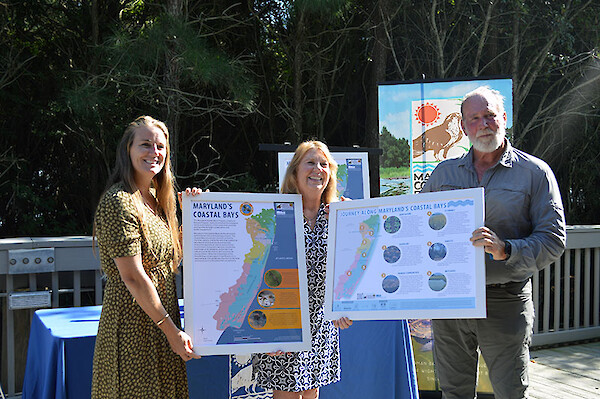
IAN developed a watershed map with the Maryland Coastal Bays Program that will be put up in classrooms in Worcester County. The map posters aim to educate students about the local and environmental value of the Coastal Bays, instilling a sense of ownership and familiarity with the watershed. The two-sided classroom map posters will also be available in libraries and other community centers.
Chesapeake Monitoring Cooperative Database Reaches 1 Million Water Quality Samples
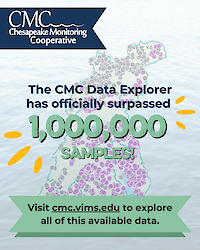
The Chesapeake Data Explorer has reached one million water quality samples! This achievement reflects the efforts of all the monitoring volunteers, coordinators, waterkeepers, and partner organizations who have worked hard to collect water monitoring data all over the Chesapeake Bay watershed. The Chesapeake Monitoring Cooperative (CMC) collects and publishes this data through the Chesapeake Data Explorer for use by the Chesapeake Bay Program and state water assessments.
Fun at the 2025 IMET Open House
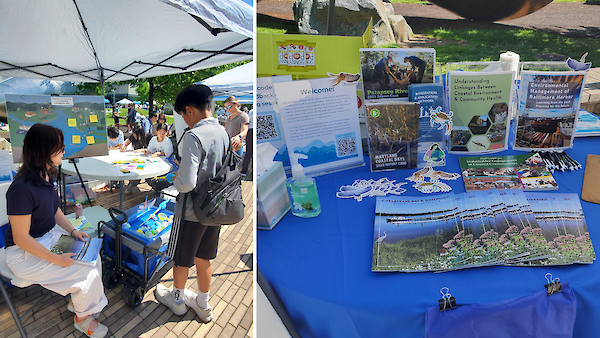
On Saturday, May 10th, IAN joined IMET at their annual open house, this year in partnership with Baltimore Public Works's Big Truck Day. The event was hosted across IMET's parking lot and Pierce's Park, and featured trash, recycling, and construction trucks, education about public works, hands-on STEM activities, microscopes, touch tanks, and more. The IAN team surveyed attendees on their concerns and hopes about the Chesapeake Bay, and educated through a Fishing for Chesapeake Bay Facts game. It was a beautiful day with a great turnout. Thank you to IMET for hosting, and we'll see you there next year!
Meet the Scientist: Ann Foo
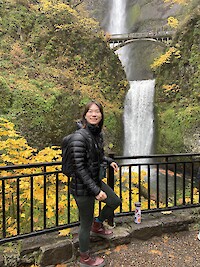
Hi everyone, I’m Ann Foo, and I’m a science communicator at IAN. I have worked here since 2022, and I really feel like I’ve found my niche at the intersection of science and design. I don’t have an educational background in environmental science—I got dual degrees in cell biology and Greek and Roman history, with a big focus on art and language—but I’ve always been a nature kid.
During undergrad, I worked in a food science lab that studied how to minimize foodborne pathogens on crops and traced outbreaks of E. coli and salmonella using PCR. I also spent a lot of time in greenhouses, growing tomato seeds in sterile rooms, and autoclaving heaps of veggies. I planned to go into medical research, but once working full-time in a neuroscience lab doing schizophrenia research, I found that I enjoyed working on diagrams, presentations, and posters much more than the actual benchwork. A mentor encouraged me to focus on communication, design, and writing, and that led me to IAN.
I have learned so much since joining IAN, and I love everything about what we do. I love talking to people and connecting them with data and resources to better protect or understand their environment. I love doing workshops for middle school teachers to combine art and science in their curricula. I love using design to make information more accessible. I love that some days, I just get to draw a ton of fish! The work we do at IAN connects us with people around the world who are studying and caring for the world around them. Effective environmentalism must be intersectional and must focus on addressing inequity. Most of all, I love working alongside so many people who care deeply about both the environment and the people who live here.
If you value research like Ann's, consider donating to IAN here.
Third annual Patapsco Report Card out now
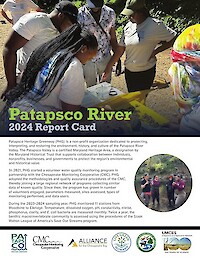
Patapsco Heritage Greenway (PHG) has released its third annual Report Card in partnership with the Chesapeake Monitoring Cooperative (CMC) and UMCES IAN. PHG started its water quality monitoring program in 2021 and now monitors 11 locations along the river. The Patapsco River earned a C+ this year, and conductivity continues to score poorly, likely due to years of excessive and inefficient winter salting practices. PHG offers Smart Salter workshops to combat this, where volunteers can learn how to monitor chloride using a Salt Watch kit and how to use salt and alternatives more efficiently on surfaces during winter. Check out the report card and learn more at https://www.patapsco.org/water-quality-monitoring/.
This report card also spotlights the Daniels Dam Feasibility Study. The Maryland Department of Natural Resources is considering whether or not to remove the dam. Removal of other dams along the Patapsco has improved ecosystem health and restored access to natural habitats. To learn more and contribute your thoughts, visit https://dnr.maryland.gov/publiclands/Pages/daniels-dam-feasibility-study.aspx.